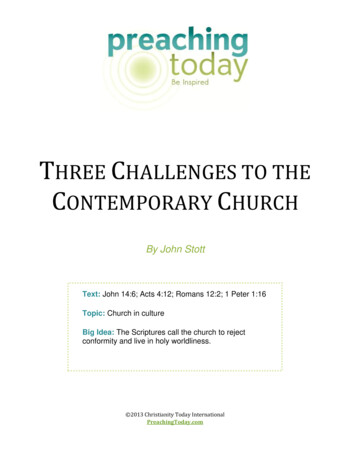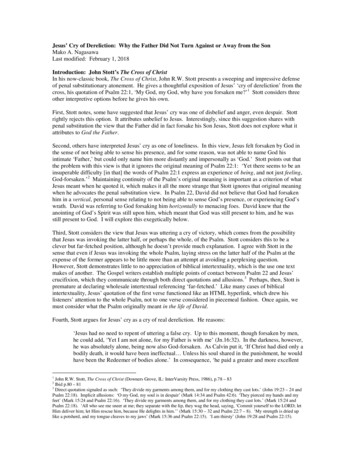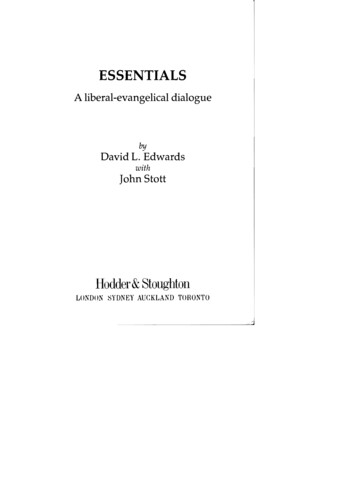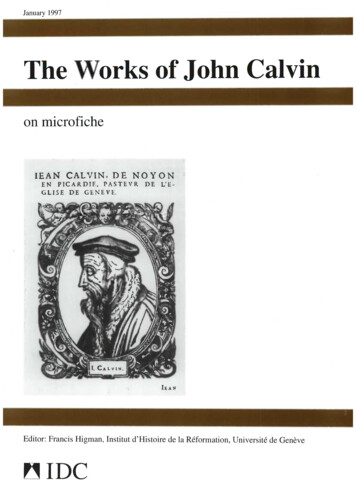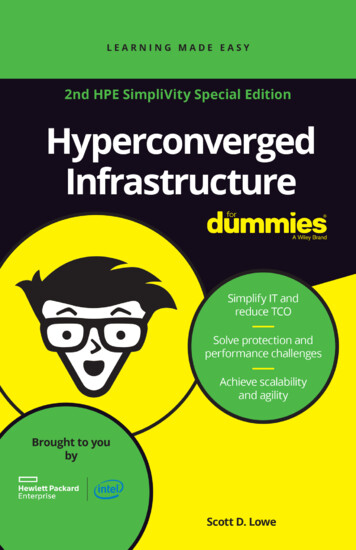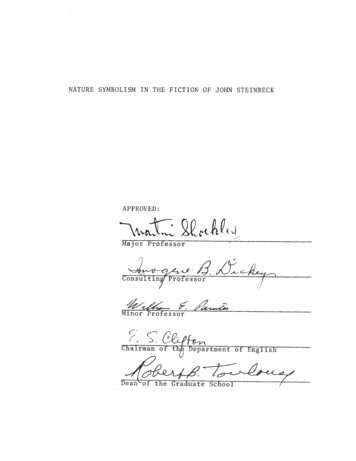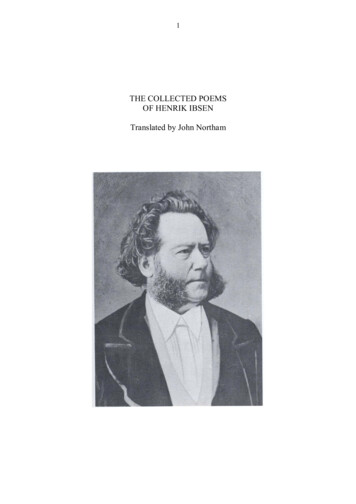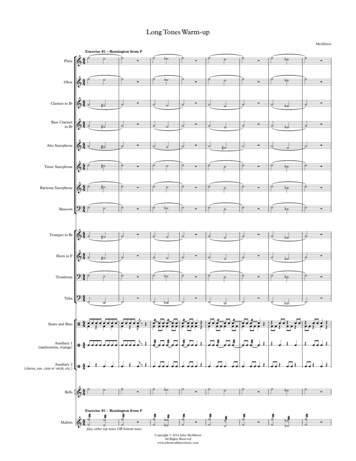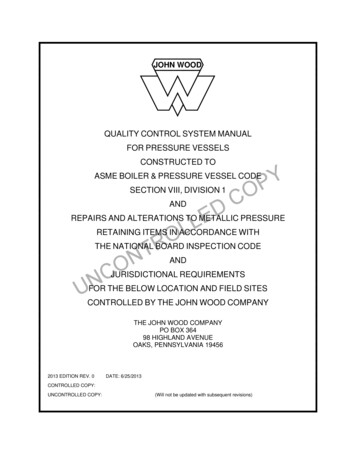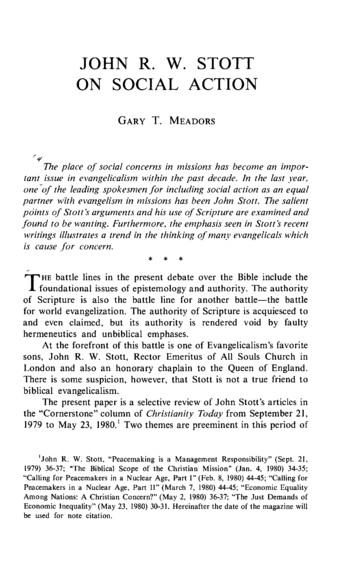
Transcription
JOHN R. W. STOTTON SOCIAL ACTIONGARYT.MEADORS·'.!!The place of social concerns in missions has become an important issue in evangelicalism within the past decade. In the last year,one of the leading spokesmen for including social action as an equalpartner with evangelism in missions has been John Stott. The salientpoints of Stotts arguments and his use of Scripture are examined andfound to be wanting. Furthermore, the emphasis seen in Stotts recentwritings illustrates a trend in the thinking of many evangelicals whichis cause for concern.* * *HE battle lines in the present debate over the Bible include thefoundational issues of epistemology and authority. The authorityof Scripture is also the battle line for another battle-the battlefor world evangelization. The authority of Scripture is acquiesced toand even claimed, but its authority is rendered void by faultyhermeneutics and unbiblical emphases.At the forefront of this battle is one of Evangelicalism's favoritesons, John R. W. Stott, Rector Emeritus of All Souls Church inLondon and also an honorary chaplain to the Queen of England.There is some suspicion, however, that Stott is not a true friend tobiblical evangelicalism.The present paper is a selective review of John Stott's articles inthe "Cornerstone" column of Christianity Today from September 21,1979 to May 23, 1980. 1 Two themes are preeminent in this period ofT1John R. W. Stott, "Peacemaking is a Management Responsibility" (Sept. 21,1979) 36-37; .The Biblical Scope of the Christian Mission" (Jan. 4, 1980) 34-35;"Calling for Peacemakers in a Nuclear Age, Part I" (Feb. 8, 1980) 44-45; "Calling forPeacemakers in a Nuclear Age, Part II" (March 7, 1980) 44-45; "Economic EqualityAmong Nations: A Christian Concern?" (May 2, 1980) 36-37; "The Just Demands ofEconomic Inequality" (May 23, 1980) 30-31. Hereinafter the date of the magazine willbe used for note citation.
130GRACE THEOLOGICAL JOURNALwntmg: The Christian as a peacemaker and the need for Christianconcern for universal opportunity for economic equality.A proper and full evaluation of Stott would require an in-depthstudy of all of his publications in chronological order, especially from1966 to the present, a period of shifting from his original position onmissions to his present emphasis on social action. This study, however is not within the scope of the present review.AN INTRODUCTION TO STOTT'S ASSERTIONSThe purpose of this section is to give an overview of Stott'sassertions in the articles cited in the introduction. Several aspects ofthese articles will be dealt with in more detail in the following sectionsof this review.Initial backgroundThe articles presently under consideration take on more meaningwhen viewed in reference to Stott's controversy with Arthur Johnstonof Trinity Evangelical Divinity School. Johnston published TheBattle for World Evangelism in 1978. In this work he surveyed thehistory of modern evangelism, particularly in light of the ecumenicalmovement. He pointed out how Lausanne is slipping dangerously inthe same direction. He also presented some severe criticisms of Stottand his shift from evangelism only to evangelism and social action asequal partners in world mission. Johnston went so far as to declarethat "Stott has dethroned evangelism as the only historical aim ofmission. " 2Stott responded to Johnston in his "Cornerstone" Column inChristianity Today.Brother Art, you say that I have "dethroned evangelism as theonly historical aim of mission"; I would prefer to say that I haveattempted to "enthrone love as the essential historical motivation formission. " 3The emphasis of Stott's post-Johnston writing would lead one toconclude that there is really only room for one master on the throne,namely, "love" as evidenced by social action.Stott has not always expressed himself for a dual mission. Hedescribes his own journey in mission thinking from Berlin in 1966 tothe publication of Christian Mission in the Modern World in 1975.2Arthur Johnston, The Battle for World Evangelism (Wheaton: Tynda1e,1978) 303.3Stott, 1I 4/80, 35.
MEADORS: STOTT ON SOCIAL ACTION131After exposing the biblical teaching for the great commission, Stottremarks,The cumulative emphasis seems clear. It is placed on preaching witnessing and making disciples, and many deduce from this that themission of the church, according to the specification of the risen Lord,is exclusively a preaching, converting and teaching mission. Indeed, Iconfess that I myself argued this at the World Congress on Evangelismin Berlin in 1966, when attempting to expound the three major versionsof the Great Commission.Today, however, I would express myself differently. It is not justthat the commission includes a duty to teach converts everything Jesusliad previously commanded (Matthew 28.20), and that social responsibiJity is among the things which Jesus commanded. I now see moreclearly that not only the consequences of the commission but the actualcommission itself must be understood to include social as well asevangelistic responsibility, unless we are to be guilty of distorting the, words of Jesus. 4Stott proceeds, immediately after making the above point, toredefine Christian mission. He asserts that the J ohannine commissionconstitutes the real key to mission. He explains John's view ofmission in relation to Jesus' statement that "as the Father hath sentme, so send I you" (John 17: 18; 20:21). In answer to the question "in hat sense was the Son sent," he reduces the Father's commission tothe Son to one of service. Jesus was sent to serve and likewise we aresent to serve. 5Stott's view of service, however, is social, not redemptive. Whileit was within the mission of Christ to be both a servant and a Savior(Mark I0:45), we are only able to be servants since "we are notsaviors. " 6 He insists that we are to serve as Jesus served: "he fedhungry mouths and washed dirty feet, he healed the sick, comfortedthe sad and even restored the dead to life. " 7Stott's observations are only partially true. Jesus did serve,but his service was redemption oriented, not service oriented. He wasthe Suffering Servant of Jehovah and all of his acts of servicewere designed to magnify his redemptive mission. They were notdesigned to draw attention to themselves as acts of service butto draw attention to the Servant as the promised Messiah. Jesus'response to the disciples of John the Baptist makes this quite clear(cf. Matt 11:2-6).4John R. W. Stott, Christian Mission in the Modern World (Downers Grove:InterVarsity, 1975) 23.5lbid., 23, 246lbid., 24.7Ibid.
132GRACE THEOLOGICAL JOURNALFrom his limited view of the J ohannine commission, Stottbuilds a structure of social action as "a partner of evangelism." 8 Healso appeals to the great commandment to love your neighbor assupport for social action.Stott's concept of the Johannine commission constitutes a moveto support his burning desire to wed evangelism and social action asequal in importance. It is the same kind of invalid hermeneutic whichhe employs in the articles about to be analyzed.The "Cornerstone" articlesThe "Cornerstone" articles from September, 1979, to May, 1980,reflect Stott's deepening commitment to evangelical involvement insocial action. They also clearly reflect Stott's involvement withLausanne's c ll for a simple life style, 9 an aspect of the continuinginfluence of Lausanne in which Stott is intimately involved.The industrial problems of Britain during the winter of 1978-79stimulated Stott to formulate a theology of peacemaking which heextends to various domains. He asserts:Social turmoil is of special concern to Christians because we are inthe business of right relations. Reconciliation is at the top of ouragenda because it is at the heart of our gospel. Jesus is the world's supreme peacemaker, and he tells his followers to be peacemakers too. 10Having modified the spiritual concept of reconciliation to include sociopolitical areas and having put these areas at the top of theevangelical agenda, Stott proceeds in his series of articles to balancenumerous concepts upon the foundation of his view of a peacemaker.The following chart summarizes the articles.Industrial justice (10/21/79)Social missions ( 1/4/ 80)Anti-war/nuclear (2/8/80)Political involvement (3 I 7 I 80)Universal opportunity foreconomic equality (5 I 2,23 I 80)Christian Peacemakers8lbid., 27.Cf. International Consultation on Simple Lifestyle publication, "An EvangelicalCommitment to Simple Lifestyle" (March, 1980). Obtain from Unit on Ethics andSociety, World Evangelical Fellowship, 300 W. Apsley St., Philadelphia, PA 19144.10Stott, 9/21/79, 36. He does not develop Matt 5:9 theologically until 2/8/80.9
MEADORS: STOTT ON SOCIAL ACTION133Stott evaluates industria/justice from the perspective of 1 Kings12. He sees in this passage the principle of "mutual service arisingfrom mutual respect." 11 His evaluation, however, is strongly in favorof the working class. He lays the whole burden for reconciliation onmanagement by calling for a commitment to (1) abolish discrimination; (2) increase participation; and (3) emphasize cooperation.Stott says many things which are true and reasonable in thesocio-political realm. Our argument is not with his politics and socialconcerns but ( 1) with his presentation of these ideas under the guiseof biblical authority and (2) with his call to the Christian communityto fprsake (in emphasis if not in essence) biblical models of evangelis in favor of social models.For example, management, he says, is obligated by biblicalauthority to practice profit sharing. "Profit sharing also rests onbiblical principle: the laborer is worthy of his hire." 12 We have noproblem with Paul, but we have our doubts about this moderninterpretation.He further asserts thatIn the last century Christians opposed slavery because by ithumans were dehumanized by being owned by others. In this centurywe should oppose all labor arrangements in which humans are dehumanized by being used by others-even if they have signed awaytheir responsibility in a voluntary contract. 13These kinds of comments have far reaching ramifications. Inregard to profit sharing, one wonders how Stott would explain Jesus'parable of the laborers in the vineyard (Matt 20:1-1 6).Stott's concept of "dehumanizing" 14 is even more alarming inlight of the biblical concept of God's ownership, and in light of theapostles' nonresistance to slavery. Does the apostles' silence makethem guilty of dehumanizing by omission? Is God culpable of dehumanizing when he exercises his sovereign right of ultimate ownership in consigning humans to hell?Stott begins to labor his linking of social mission with evangelism in his January 4 article under the domain of holistic missions.God's character, he says, demands "that he is the God of social justiceas well as personal salvation." 15 The nature of man demands "that theneighbor we are to love and serve is a physical and social as well as a11Stott, 9/21/79, 36.lbid., 37.13lbid.14He also dehumanized Lazarus in Luke 16; cf. 5/2/80, 37.15Stott, 1/4/80, 34.12
134GRACE THEOLOGICAL JOURNALspiritual person. " 16 The truth or falsehood of these assertions is notthe issue. The issue is what constitutes the great commission in itsbasic biblical statement: evangelism or social justice. Love and serviceare not absolutes and cannot be judged apart from a truth base; loveand service will deteriorate into mere social action if not madesubservient to truth. This seems to be the direction in which Stott isgoing and it is this drift to which we object.Stott's anti-war/ nuclear position appeals to Matthew 5:9 for atheological base. He describes the alarming world scene and thenasserts thatIt is against this background of horror that we need to hear againthe words of Jesus: Blessed are the peacemakers, for they shall becalled God's children. Peacemaking is a divine activity, and we canclaim to be authentic children of God only if we seek to do what ourheavenly Father is doing. Thus, the basis for peacemaking is theological: it derives from our doctrine of God. 17A later section will investigate this use of the seventh beatitude.Meanwhile, this same article contains several theologically suspectstatements.First, Stott equates the concepts of salvation and peacemaking."For Scripture calls judgment his 'strange work'; his characteristicwork, in which he delights, is salvation or peacemaking." 18Second, he asserts that Christ's "resort to violence of word anddeed was occasional, alien, uncharacteristic; his characteristic wasnonviolence; the symbol of his ministry is not the whip but thecross." 19 In response, one wonders what happened to the book ofRevelation-when the Son of Man in accord with all prophetic Scripture will demonstrate his violent side. One also is puzzled when Jesusmakes statements such as "I came not to send peace but a sword"(Matt 10:34). This is a strange kind of social action from the greatestof all peacemakers. In 1 Corinthians 5, and in many other passages,the Bible clearly teaches the truth that it is sometimes necessary to bea "division-maker" in order to be a preserver of truth.Stott's discussion of how to inculcate peacemaking in a nuclearage points out the necessity of prayer so that "we might lead a quietand peaceable life" (1 Tim 2:1-2); 20 however, his recommendations forpolitical activism are cultural and not biblical. In fact, they actually16Ibid.Stott, 2/8/80, 44.18lbid.191bid.20Stott, 317 I 80, 44.17
MEADORS: STOTT ON SOCIAL ACTION135violate the principle which Paul presents in Timothy in that some ofthe political activism involved can hardly be labeled as part of a quietand peaceable life. When Christians are advised to "support anymeans [italics mine] to reduce this confrontation of suspicion andfear" (referring to the bluff tactics of the U.S.A. and Russia), onewonders if this is involved in Paul's prescription for a quiet andpeaceable life.Stott rises to his bolde
JOHN R. W. STOTT ON SOCIAL ACTION GARY T. MEADORS The place of social concerns in missions has become an impor-tant issue in evangelicalism within the past decade. In the last year, one of the leading spokesmen for including social action as an equal partner with evangelism in missions has been John Stott. The salient points of Stotts arguments and his use of Scripture are examined and found .
